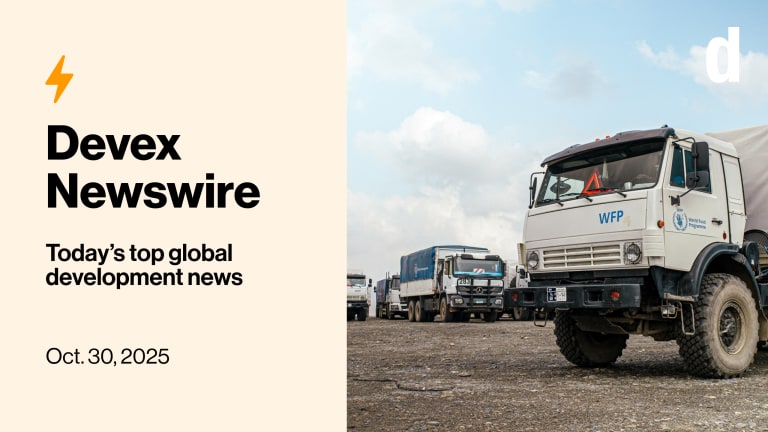
The China-led Asian Infrastructure Investment Bank has stopped “all activities relating to Russia and Belarus” pending a review, citing the war in Ukraine.
Sign up for Devex Invested
The must-read weekly newsletter that keeps you up to date with news about business, finance, and the SDGs.
Separately, the New Development Bank — which finances projects in emerging and developing markets and is sometimes known as the “BRICS bank,” in reference to founding members Brazil, Russia, India, China, and South Africa — said Thursday that it had “put new transactions in Russia on hold” amid “unfolding uncertainties and restrictions.”
The moves, which come a week after Moscow invaded its southwestern neighbor, follow a total halt to all World Bank activity in both Russia and Belarus.
NDB, like AIIB, is headquartered in China, which has been a staunch ally of Moscow, though it abstained this week in a United Nations General Assembly vote condemning the Russian invasion of its neighbor.
AIIB has two major projects in Russia, worth a combined $800 million, according to information on its website.
The bank said its moves come amid the need to “safeguard the financial integrity of AIIB, against the backdrop of the evolving economic and financial situation.”
In recent days, the United States, European nations, and key Asian allies have all imposed tough sanctions on Russia, including measures directly choking off parts of its banking system, deeping the country’s economic isolation.
Moody’s ratings agency joined Fitch Ratings in downgrading Russian sovereign debt to “junk” status, a sign of growing worries over Russia’s ability and willingness to meet its obligations. Investors are increasingly downbeat on the country, with one saying it is simply “uninvestible.”
The European Bank for Reconstruction and Development, for its part, is still weighing measures against Russia and Belarus, including cutting off finance. Belarus is allied with Moscow in the invasion, including allowing its territory to be used as a staging ground.
In a statement Thursday, AIIB was cautious, expressing concern for “all who are suffering” and reaffirming a commitment to multilateralism. The bank said that “international law lies at the very core of our institution.”
AIIB pledged to help its members deal with the war’s fallout, citing commodity price shocks and financial market volatility. Commodity prices have been soaring over the past week, including huge spikes in oil and gas, along with wheat, corn, and other staple foods.
The World Bank has warned that sustained inflation will hurt the world’s poor, coming on the back of already elevated prices. The Washington-based anti-poverty lender said in a statement Wednesday that it was cutting off Moscow.
“Following the Russian invasion of Ukraine and hostilities against the people of Ukraine, the World Bank Group has stopped all its programs in Russia and Belarus with immediate effect,” it said.
The move includes World Bank advisory services to Russia. New investments in the country were already stopped in 2014, the year that Russia annexed Ukraine’s Crimea peninsula.
The lender is also working on a $3 billion support package for Ukraine, the first tranche of which will be for at least $350 million and could still be approved by the board this week. The International Monetary Fund is also devising support for the country.
Eric LeCompte, executive director at the Jubilee USA Network, told Devex that Ukraine has payments due on IMF loans, which the country will now struggle to make given the dire circumstances.
IMF could “give Ukraine some breathing space,” by agreeing to delay repayments, said LeCompte, whose organization advocates for poverty reduction around debt issues.
“The IMF will likely take that action, but it should do it sooner rather than later, to signal support,” he said.
Ukraine also owes surcharge payments on its loans, and calls are increasing for IMF to let them slide. The surcharge payment for this month was estimated at about $29 million.
Analysts have noted that institutional support to Ukraine is not without risks either, given the heavy Russian bombardments and uncertain future. There are also debates about using concessional lending instruments, generally reserved for the world’s lowest-income nations, in what is officially a middle-income country in Europe.
With more than 1 million people having already fled Ukraine to neighboring countries, there are growing expectations that host countries in Europe could need support. The World Bank and IMF, in a joint statement this week, said they were assessing needs and were prepared to step in.





